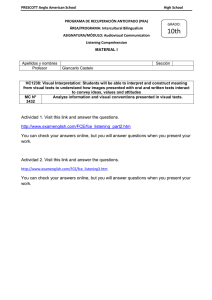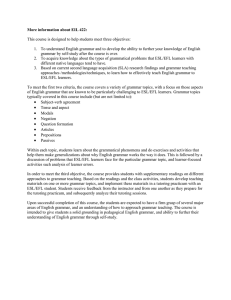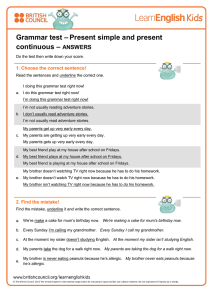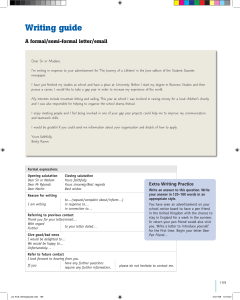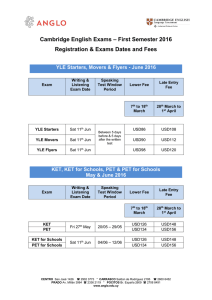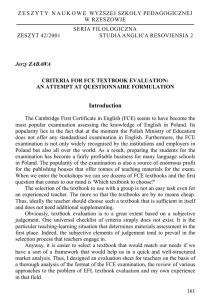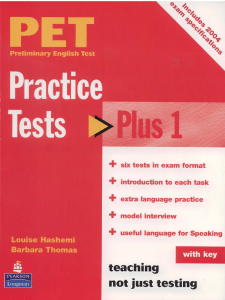Dear student
Anuncio
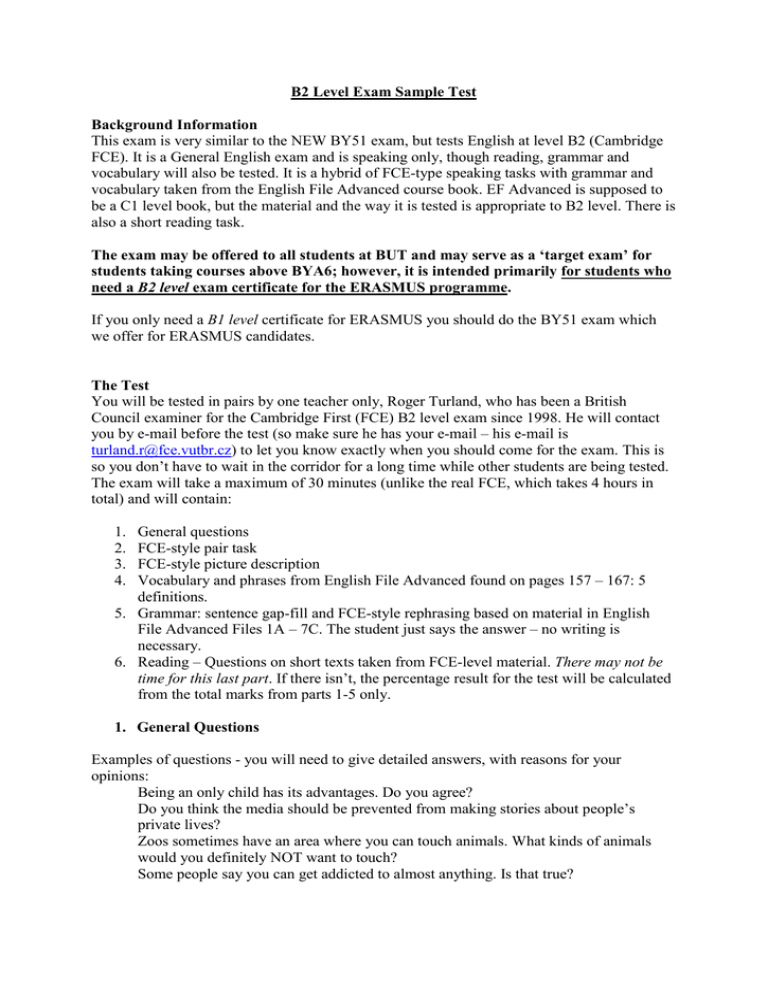
B2 Level Exam Sample Test Background Information This exam is very similar to the NEW BY51 exam, but tests English at level B2 (Cambridge FCE). It is a General English exam and is speaking only, though reading, grammar and vocabulary will also be tested. It is a hybrid of FCE-type speaking tasks with grammar and vocabulary taken from the English File Advanced course book. EF Advanced is supposed to be a C1 level book, but the material and the way it is tested is appropriate to B2 level. There is also a short reading task. The exam may be offered to all students at BUT and may serve as a ‘target exam’ for students taking courses above BYA6; however, it is intended primarily for students who need a B2 level exam certificate for the ERASMUS programme. If you only need a B1 level certificate for ERASMUS you should do the BY51 exam which we offer for ERASMUS candidates. The Test You will be tested in pairs by one teacher only, Roger Turland, who has been a British Council examiner for the Cambridge First (FCE) B2 level exam since 1998. He will contact you by e-mail before the test (so make sure he has your e-mail – his e-mail is turland.r@fce.vutbr.cz) to let you know exactly when you should come for the exam. This is so you don’t have to wait in the corridor for a long time while other students are being tested. The exam will take a maximum of 30 minutes (unlike the real FCE, which takes 4 hours in total) and will contain: 1. 2. 3. 4. General questions FCE-style pair task FCE-style picture description Vocabulary and phrases from English File Advanced found on pages 157 – 167: 5 definitions. 5. Grammar: sentence gap-fill and FCE-style rephrasing based on material in English File Advanced Files 1A – 7C. The student just says the answer – no writing is necessary. 6. Reading – Questions on short texts taken from FCE-level material. There may not be time for this last part. If there isn’t, the percentage result for the test will be calculated from the total marks from parts 1-5 only. 1. General Questions Examples of questions - you will need to give detailed answers, with reasons for your opinions: Being an only child has its advantages. Do you agree? Do you think the media should be prevented from making stories about people’s private lives? Zoos sometimes have an area where you can touch animals. What kinds of animals would you definitely NOT want to touch? Some people say you can get addicted to almost anything. Is that true? 2. FCE-style pair task The examiner will say something like: “In this part of the test you are going to work together to solve a task. Please look at this set of pictures. I want you to imagine that your friend Jon runs a café. He has asked you for some ideas about how to make it more popular with customers. Discuss the suggestions you can see on the paper, saying how successful they might be, and then choose the two best ones. You have about two minutes for this.” Example obtained from here: http://discover-fce.wikispaces.com/ 3.FCE-style picture description Examiner: “Now I'd like you to talk on your own for about a minute. I'm going to give you two different photographs and I'd like you to talk about them. Here are your two photographs. They show people having meals away from home. I'd like you to compare these photographs and say whether you prefer eating in restaurants or eating picnics out-of-doors.” 4. Vocabulary Examiner: “Now it’s time to test vocabulary. Student B, please look at the 5 grammar questions while I test Student A on vocabulary. Student A, I’m going to give you 5 definitions and you need to tell me the answer for each one.” Examples: What do you call a family where there is only one adult bringing up the children? (a singleparent family) Do you know a phrase with “get” which you can use when someone often makes you angry? You say “He really gets on…” (my nerves) Can you think of an adjective which means the same as ‘rich’? (wealthy) Imagine this situation – in your kitchen one of the taps won’t close completely so small amounts of water keep falling out. What verb is used to describe what the tap is doing? (drip) If someone says a film is ‘overrated’, what does this mean? (That it’s not as good as people usually say it is) 5. Grammar Examiner: “Now for grammar. Look at the five questions and the second sentences below each one. Can you tell me what the second sentences should be?” Examples: Complete the second sentence so it has a similar meaning to the first using the underlined word. 1. You must do exactly what the manager tells you. carry – 4 words You must____________________________________ instructions exactly. (Answer: You must carry out the manager’s instructions exactly.) 2. If you are careful, you won’t make any mistakes. order – 3 words Be careful____________________________________ to make any mistakes. (Answer: Be careful in order not to make any mistakes.) 3. Mike lost his job last month, so he has plenty of free time at the moment. got – 3 words Mike has had a lot of free time since he ______________________________ last month. (Answer: Mike has had a lot of free time since he got the sack last month.) 4. Corfu sounds like a nicer place for our holiday. rather – 3 words I ____________________________________ to Corfu for our holiday. (Answer: I would rather go to Corfu for our holiday.) 5. She had so many presents it took her several hours to open them all. lot – 3 words Opening her presents took Joy several hours – she had _______________________________ of them. (Answer: Opening her presents took Joy forever – she had such a lot of them.) 6. Reading Examiner: “The last part of the exam tests reading. I am going to give each of you a short text and ask you four questions about your text after you have read it.” Example: After months of dismal icy chill the snow finally began to melt and the forecasts of blizzards turned to prophecies of early spring rain heading in from the Atlantic. Day after day, looking out of our windows we saw sinister grey clouds piling up high over the hills to the west. They twisted and turned, rising eastwards and upwards, warning of what was to come. We’d seen enough of the sky: now we couldn’t stop watching the river as it flowed past our cottage. Every day it was becoming fuller and wilder from the heavy rain now falling up in the hills, where the reservoir was filling up and fast reaching danger level. By the weekend it was all just too much to bear, so we went for a car trip away from the place for the day. The city, with its jams, crowds, smoke and noise suddenly seemed like an idyllic paradise compared to our country cottage, and we enjoyed strolling round the centre with our overcoats on. Our umbrellas, brought in case of rain, stayed folded in our bags; I think it was all falling on ‘our’ nearby hills. We popped into a café for lunch and did some window shopping but didn’t purchase anything major – given our situation we thought it best to save our money for the proverbial ‘rainy day’ that could be arriving any time now. Question examples What month might it have been? (February, March, April…, etc.) Why was the writer so interested in the weather? (Because he or she lived by a river and was afraid of flooding from the reservoir) Why did they leave their home on Saturday? (The stress was too much for them) Why does the narrator compare the ‘the city, with its jams, crowds, smoke and noise’ to an ‘idyllic paradise’? (It’s in contrast with all the stress he/she is feeling in the quiet countryside) What was the ‘rainy day’ the author mentioned that prevented them from spending money in the city? (The phrase ‘save it for a rainy day’ means ‘save it because you may need it to deal with a problem in the future’ – so in this case the ‘rainy day’ would be the flood they were fearing) How the exam is marked In the first half of the test (parts 1-3) students will be awarded a maximum of 20 marks for grammar and vocabulary, up to 20 marks for making logical, connected sentences (particularly in part 3), and as many as 10 marks for pronunciation and 10 marks for interaction with their colleague (particularly in part 2) and with the examiner. Students will be marked according to Cambridge FCE criteria. In the second half of the test students will get up to 10 marks for vocabulary based specifically on English File Advanced and 10 marks for grammar also based on that book. The reason the book is used is that a. the material covered is appropriate to a good lower advanced level student, and b. it enables students to prepare for this part of the exam if they wish. Finally, the reading part brings a maximum of 20 marks, as reading is a useful skill for studying in a foreign language. Due to time constraints the section may not take place and the grade will be decided from the first five sections. How to prepare? You can obtain FCE past papers and practice with them: Speaking paper parts 1, 2 and 3, and the reading paper. If you haven’t done courses BYA21 – 23 then I recommend at least looking at New English File Advanced Student’s Book pages 157 to 167 for the vocabulary, 136 – 156 for grammar, and the Teacher’s Book for the answers. You may also find example FCE speaking tests on e.g. YouTube, practice your basic grammar via online exercises and improve your listening/reading skills and overall knowledge by simply reading and listening actively online (just for example, try listening to these podcasts: http://www.britishcouncil.org/professionals-podcast-english-listening-downloadsarchive.htm); ‘reading and listening actively’ means noting new vocabulary while you listen and being aware of or analyzing the grammar you see and hear, taking time to study new language that you encounter. Courses BYA7, 8, and 20-23 are aimed at bringing students from intermediate to lower advanced level, especially BYA21-23, which uses the English File Advanced book. Bear in mind though that if you have just managed to pass BY51 with e.g. a D/2.5 then just attending these six courses probably won’t be enough to get you from your level to B2 level – you will need to study, read and practice listening extensively in your own time as around 70 x 100 minutes in class is too little time to cover everything thoroughly. Please e-mail me if you have any other questions. Roger Turland turland.r@fce.vutbr.cz
